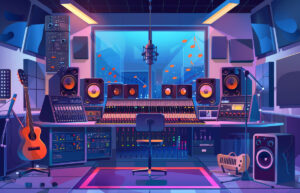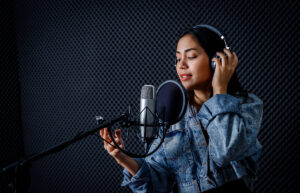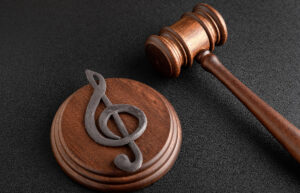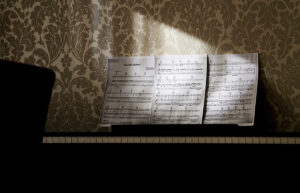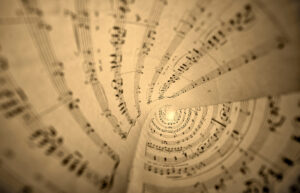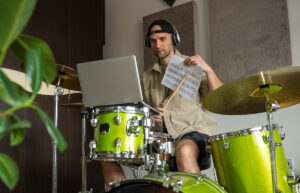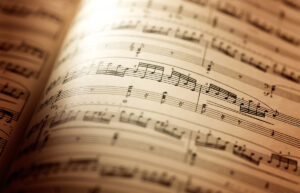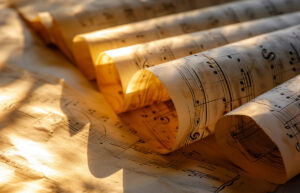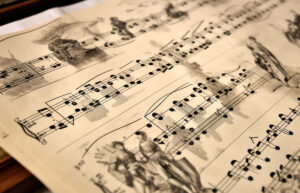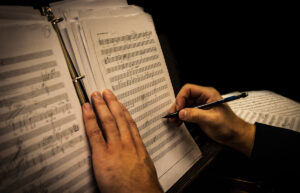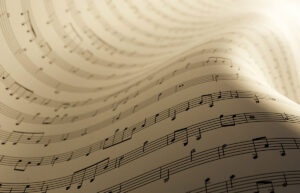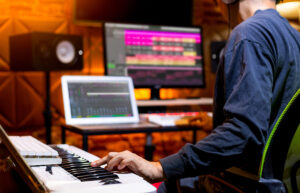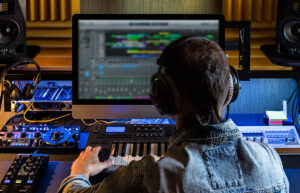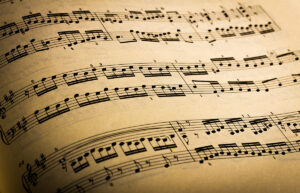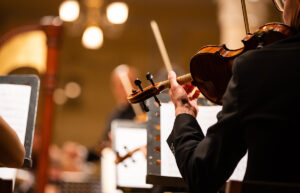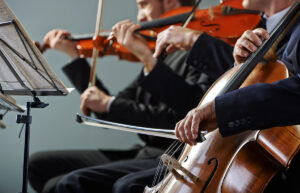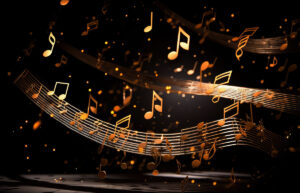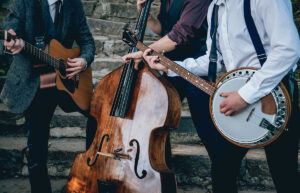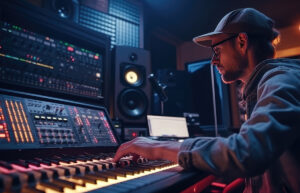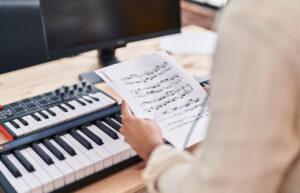How to Compose Music: Tools, Methods, & Tips

Welcome to the exciting world of music composition, where every note holds the potential to evoke emotions, tell stories, and transport listeners to new realms. Have you ever wondered how music is composed and what all it involves? Get ready to explore how to compose music – the art of crafting melodies, harmonies, and rhythms that resonate with the soul.
Welcome to TheDemoStop, now join the community!
Connect with artists, fans and producers around the world.
What is music composition?
A musical composition is an arrangement of sounds and silences designed to express ideas and elicit feelings. Pitch, rhythm, harmony, melody, and shape are some of the essential components of sound that make up a musical composition.
Who can compose music?
Anyone with a passion for music and a desire to express themselves creatively can learn how to compose music. With dedication, practice, and a willingness to experiment, individuals can unlock their potential to create original melodies, harmonies, and rhythms that reflect their unique voice and style. So, whether you’re a singer-songwriter, a classical composer, or an electronic music producer, the journey of learning how to compose music is an enriching and rewarding experience.
What tools do composers need?
Instruments
Access to various instruments allows music composers to explore different sounds and textures. Whether it’s a piano, guitar, violin, or synthesizer, each instrument offers unique possibilities for crafting melodies, harmonies, and rhythms.
Recording devices
Recording devices are essential for capturing musical ideas as they come. Whether it’s a smartphone, portable recorder, or microphone connected to a computer, being able to quickly record melodies, chord progressions, or vocal lines ensures that no idea is lost in the creative process.
Notation software
Notation software allows composers to write down their musical ideas in a clear and organized manner. Programs like Sibelius, Finale, or MuseScore enable composers to create sheet music, arrange compositions, and share their work with performers or collaborators.
Digital Audio Workstation (DAW)
A DAW serves as the central hub for music production, offering a range of tools for recording, editing, mixing, and mastering audio. Software such as Ableton Live, Logic Pro, Pro Tools, or FL Studio allows composers to compose music using virtual instruments, MDI sequencing, audio recording, and audio processing effects.
How to compose music?
The process of learning how to compose music involves a series of steps that guide composers through the creative process:
Listen and analyze everything
Listen attentively and analyze various music genres and styles. Study compositions to grasp their structure, harmony, melody, rhythm, and instrumentation. Take inspiration from a variety of sources to enrich your own musical creations.
Decide which musical instruments to use
Determine which instruments best convey the mood and emotions you want to express in your composition. Consider each instrument’s timbre, range, and capabilities to achieve your desired sonic palette.
Study music theory and sight reading
Gain a solid understanding of music theory principles such as harmony, melody, rhythm, and form. Develop sight-reading skills to notate and communicate your musical ideas efficiently.
Decide how long your piece will be
Establish the duration of your composition based on its intended purpose and audience. Consider factors such as attention span, performance context, and structural coherence.
Choose a mood and a theme
Define the emotional tone and thematic content of your composition. Explore different musical elements such as harmony, melody, and rhythm to evoke specific moods and convey your chosen theme.
Choose a song structure or format
Determining the overall form or structure of your composition. Common structures include verse-chorus. AABA, sonata-allegro, and theme and variations. Adapt the structure to suit the narrative or emotional arc of your piece.
Start with the melody
Begin composing by crafting a memorable melody that serves as the foundation of your piece. Experiment with different melodic contours, intervals, and rhythmic patterns to create an engaging musical motif.
Write down all of your ideas
Record and document your musical ideas as they arise. Use notation software, audio recordings, or handwritten sketches to capture melodies, chord progressions, and rhythmic patterns for future reference.
Work from macro to micro
Develop your composition gradually, starting with broad musical gestures and gradually refining the details. Focus on shaping the overall structure, harmony, and melody before delving into finer nuances such as dynamics, articulation, and phrasing.
Create and polish the score or chart
Transcribe your composition into a polished score or lead sheet. Pay attention to notation conventions, articulations, and performance instructions to ensure clarity and accuracy for performers.
Share it with an audience
Share your composition with friends, family, fellow musicians, or online communities to receive feedback. Perform your piece live or record it for dissemination through digital platforms or traditional media.
Revise and repeat
Reflect on the feedback received and revisit your composition with fresh ears. Make revisions to improve clarity, coherence, and expressiveness. Embrace the iterative nature of composition, continually refining your skills and expanding your creative horizons.
Welcome to TheDemoStop, now join the community!
Connect with artists, fans and producers around the world.
Tips for improving your music composition skills
Compose a little something every day
Cultivate a habit of creativity by composing music regularly if you want to learn how to compose music or improve your music. Set aside time each day to experiment with melodies, harmonies, rhythms, and structures. Even brief sessions can lead to significant progress over time.
Have a recording device handy
Always keep a recording device, such as a smartphone or portable recorder, nearby. This allows you to capture spontaneous musical ideas wherever you are. Don’t let moments of inspiration slip away; record them for later development.
Use an app for composing
Explore digital tools and apps designed for music composition. These apps often provide intuitive interfaces for creating melodies, arranging chord progressions, and experimenting with different musical elements. Embrace technology to streamline your creative process.
Beware the trap of programmed bar lines
While notation software and digital audio workstations offer convenient ways to input music, be cautious of relying too heavily on programmed bar lines. Experiment with irregular rhythms, polymeters, and non-linear structures to break free from rigid compositional conventions.
Continue developing sight-reading and composition skills
Dedicate time to practicing sight-reading and writing music by hand. These foundational skills enhance your ability to read and write musical notation fluently, enabling you to communicate your ideas effectively and efficiently.
Expose yourself to a range of musical genres
Broaden your musical horizons by exploring diverse genres and styles. Listen to classical, jazz, rock, electronic, folk, and world music to understand different compositional techniques, instrumentation, and musical traditions.
Conclusion
What is music composition?
Music composition is the art and process of creating original musical pieces by organizing sounds, melodies, harmonies, and rhythms into cohesive and expressive arrangements.
Who can compose music?
Whether you’re a professional musician, a hobbyist, or someone who simply enjoys exploring creative expressions, you can engage in music composition.
What tools do composers need?
- Instruments
- Recording devices
- Notation software
- Digital Audio Workstations (DAW)
How to compose music?
- Listen and analyze everything
- Decide which musical instruments to use
- Study music theory and sight reading
- Decide how long your piece will be
- Choose a mood and a theme
- Choose a song structure or format
- Start with the melody
- Write down all of your ideas
- Work from macro to micro
- Create and polish the score or chart
- Share it with an audience
- Revise and repeat
Tips for improving your music composition skills
- Compose a little something every day
- Have a recording device handy
- Use an app for composing
- Beware the trap of programmed bar lines
- Continue developing sight-reading and composition skills
- Expose yourself to a range of musical genres
FAQs
What is music composition?
Music composition is the creative process of crafting original musical pieces. It is done by arranging sounds, melodies, harmonies, and rhythms.
Who can compose music?
Anyone with a passion for music and a desire to create can compose music. All that’s needed is a willingness to experiment, a basic understanding of musical concepts and a desire to convey emotions and ideas through sound.
What tools do composers need?
Composers need tools like instruments, recording devices, notation software and Digital Audio Workstations (DAW).
How to compose music?
- Listen and analyze everything
- Decide which musical instruments to use
- Study music theory and sight reading
- Decide how long your piece will be
- Choose a mood and a theme
- Choose a song structure or format
- Start with the melody
- Write down all of your ideas
- Work from macro to micro
- Create and polish the score or chart
- Share it with an audience
- Revise and repeat
How do I start composing music?
Start composing music by experimenting with melodies, chords, and rhythms on your instrument of choice or using music software. You should have a willingness to experiment and play with music.
What is the best instrument to compose on?
The best instrument to compose on is subjective and depends on personal preference. Many composers use piano or guitar due to their versatility and ease of experimentation.
What are the tips for improving your music composition skills?
- Compose a little something every day
- Have a recording device handy
- Use an app for composing
- Beware the trap of programmed bar lines
- Continue developing sight-reading and composition skills
- Expose yourself to a range of musical genres


